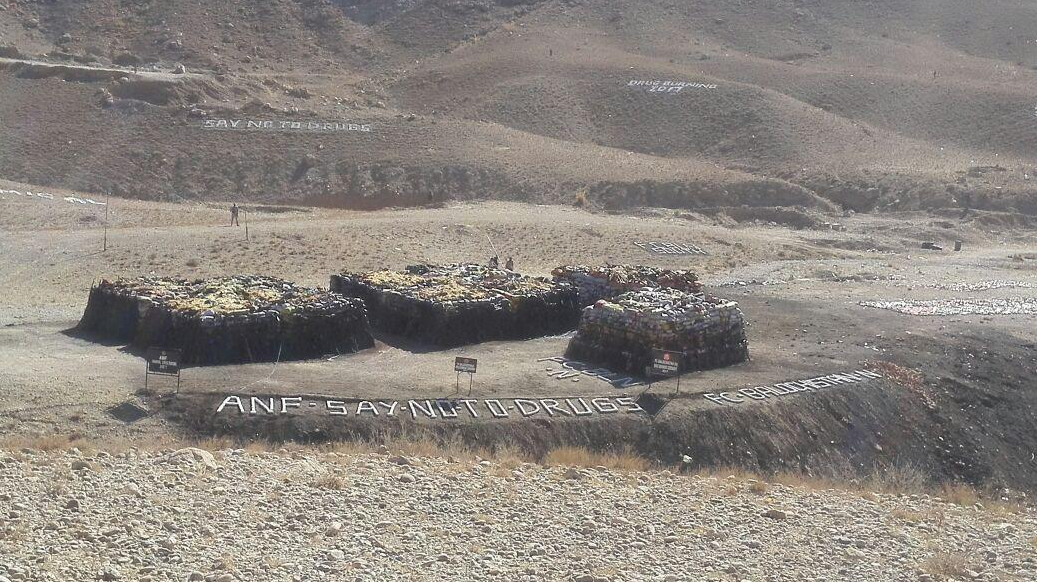National security wrap

The beat
Drugs in flames
The Pakistani Anti-Narcotics Force (ANF) held its 2017 drug-burning ceremony in Islamabad. In the presence of national officials and international representatives such as the UN Office of Drugs and Crime country head, the ANF burned more than 1.8 metric tons of narcotics. That’s only a fraction of the 135 metric tons of drugs they’ve disposed of so far this year. The moment was captured in this short video and this photo of a group of female ANF members posing in front of the flames.
Unrest in Uganda?
The parliament in Kampala began the second reading of the Constitution Amendment Bill, dubbed the ‘Age Limit Bill’, which proposes to change article 102(b) of the constitution to lift the current age limit of 75 off the country’s presidency. The parliament’s speaker ordered all security officers other than police to vacate the parliament, while outside the police presence was stepped up to prepare for anticipated protests.
Blame the FBI
This week, Nicholas Young became the ‘first police officer ever to face terrorism charges in the US’. His federal court trial began on Tuesday following a six-year FBI investigation. Young is accused of providing material support to Islamic State. The defence team is claiming that he was entrapped by federal agents, while the prosecution seeks to use his long history as a Nazi sympathiser as evidence.
CT scan
The plan to protect Tokyo 2020
The Japanese government has announced its plan for protecting the 2020 Tokyo Olympics from terrorism. Among seven key items, the plan places particular emphasis on gathering and analysing information. Japan will set up a new counterterrorism information centre, which will include officials from 11 government entities, to facilitate information-sharing about potential attacks. The plan also includes steps to protect ‘soft targets’, such as train stations and airports, and to improve rescue operations.
RIC all for CT
Russia, India and China (RIC) have called for greater international cooperation on counterterrorism and stressed the role of individual states in combating terrorism within their own borders. In a statement released after the 15th RIC trilateral in Delhi, the three foreign ministers declared that ‘their cooperation was not directed against any nation’. Russian foreign minister Sergei Lavrov described the meeting as a ‘candid, trust-based and frank exchange of views’ and offered Moscow’s support to Islamabad in combating terrorism in Pakistan.
Turkish academics on trial
The first trials of 1,128 academics who signed the ‘Academics for Peace’ petition have begun in Turkey. The prosecution is arguing that by signing the petition, which condemned the Turkish government’s actions against the country’s Kurdish minority, the academics had engaged in ‘making propaganda for a terrorist organisation’.
Check point
Kurdish–Iraqi cooperation
US-backed Kurdish forces are ‘coordinating’ with the Iraqi army to secure the Syrian–Iraqi border against the remnants of Islamic State. Commanders from the two militaries met on Sunday to ‘consult on coordinating’ border security and ‘prevent infiltration by Daesh on either side of the border’. Commanders agreed to set up observation posts along the border. This cooperation suggests that Iraqi–Kurdish relations are improving, after the Kurdish independence referendum severely backfired.
Dangerous drones
An Indian Army IAI Heron drone crashed in the Chumbi Valley in China’s Tibet Autonomous Region. The exact date of the crash isn’t known; however, Chinese protests related to the event occurred in the middle of last week. India bought 10 advanced Israeli-made Heron drones earlier this year for a total of US$400 million.
Refugee abuse in the Balkans
According to German-based NGO Rigardu, refugees and migrants attempting to cross from Serbia into Europe are enduring widespread illegal deportations and police violence, including physical assaults and electric shocks. Statements were gathered from people who claimed they had witnessed violence perpetrated by Croatian police. Many statements are supported by pictures of the injuries. Theft from refugees was also reported.
First responder
Small crises are big problems
According to Tilly Alcayna, a researcher at the Harvard Humanitarian Initiative, ignoring small crises is a recipe for global disaster. At least 42% of total economic losses in low- and middle-income countries are from small, recurrent events. Therefore, ‘neglected crises’ that may not make as many headlines could be a much better destination for development and resilience funding than the severe and attention-grabbing events humanitarian organisations usually fundraise for.
Extreme testing of extreme weather
Hiroko Tabuchi of the New York Times reported on a small team of workers who spend their time hurling debris, setting off explosions and simulating earthquakes. The team is researching hazards caused by extreme weather events for the insurance company FM Global. If being paid to cause destruction sounds like a dream job to you, then you’re in luck as FM Global is currently hiring.
Disaster drones
Jim Moore, from the Aircraft Owners and Pilots Association, followed members of Roboticists Without Borders while they gathered data about disaster-prone areas using drone technology. The group uses consumer drone systems to map out areas and processes the information so that it can be used by state and local emergency managers. The group also makes its drones available to provide active support when disasters hit.